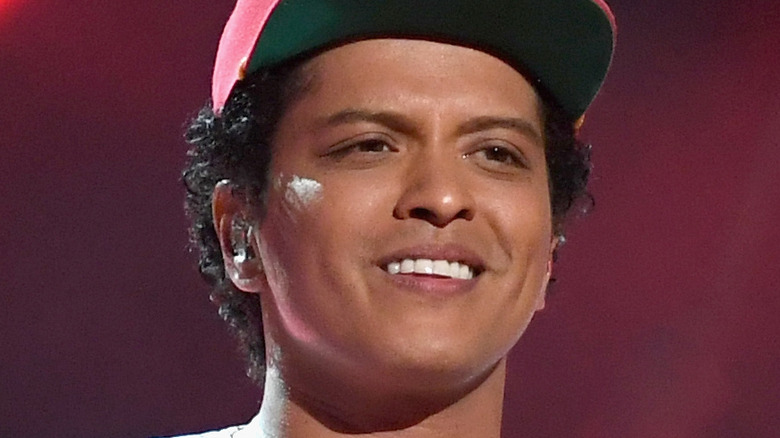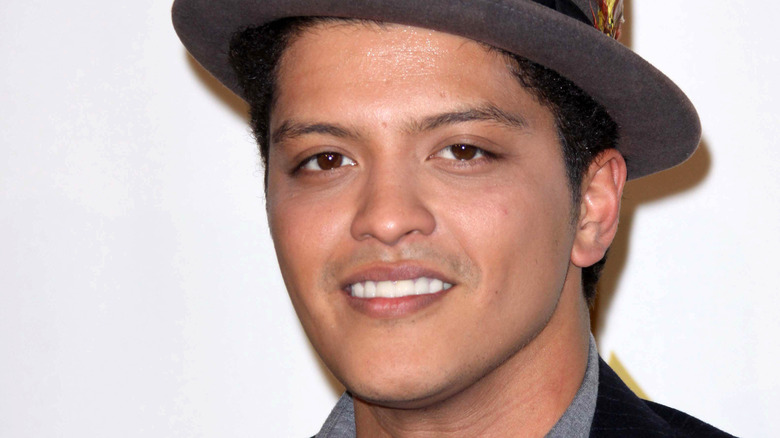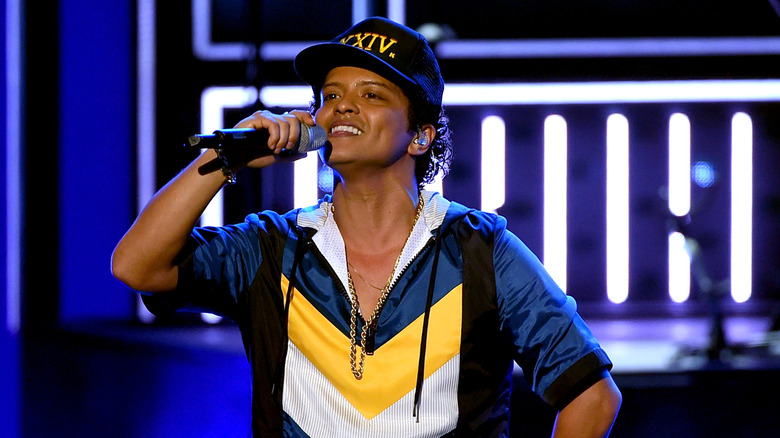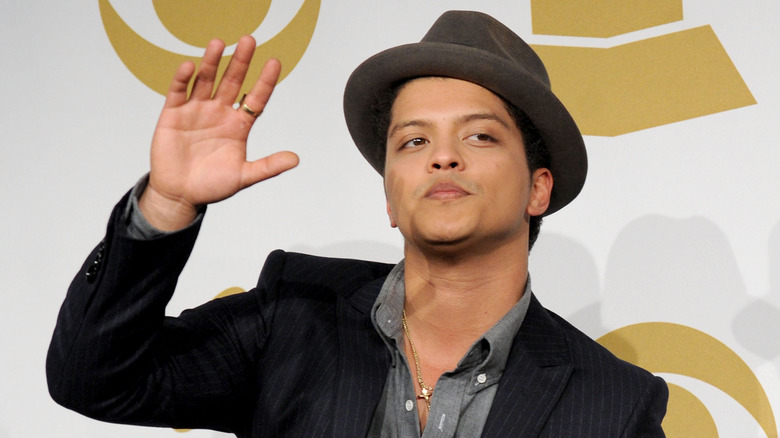The Real Reason Bruno Mars Changed His Name
In 1987, action star Bruce Willis released an album entitled "The Return of Bruno." In case the title was confusing — where was Bruno returning from, exactly? — an HBO special accompanied it, detailing the fascinating history of Willis' jazz-singing, harmonica-playing alter ego, Bruno Radolini. As Diffuser notes, the record was inexplicably Motown-inspired, and although the actor is clearly a fan, his producer evidently used "a few handfuls of studio fairy dust to distract from Willis' vocals."
Twenty years later, another Bruno arrived on the scene with his own debut album. As Forbes notes, Bruno Mars' wildly popular full-length "Doo-Wops & Hooligans" was still charting on the Billboard 200 a whole decade after its initial release. Suffice to say, Mars' output has put Willis' to shame. However, although "Bruno Mars" is a less flashy and potentially culturally confusing name compared to "Bruno Radolini," it's worth noting that both are, in fact, stage names.
Bruno Mars was the perfect name for a star on the rise
In a 2012 interview with Latina magazine, the man born Peter Gene Hernandez revealed that his father had been calling him Bruno as a nickname since he was a kid, explaining, "I was going to go by 'Bruno,' one name. Mars just kind of came joking around because that sounds bigger than life. That was it, simple as that" (via People). Bruno wasn't a random name either, with Mars explaining to Rap Up that he was a bigger child, and his father, who was a huge pro wrestling fan, thought he looked a bit like the legendary Bruno Sammartino, who was also a bigger guy. The "24K Magic" hit-maker was raised in Honolulu, Hawaii but moved to Los Angeles at the age of 17, immediately after high school, to become a star.
Bruno Mars was concerned that music producers would assume he wanted to make Latin records, due to the surname Hernandez, so that's why he decided to add the "out of this world" surname. The R&B star admitted to GQ he didn't want to be stereotyped, particularly since, at the time Mars was coming up, the likes of Enrique Iglesias were massive stars. Regardless of his name, clearly Mars was always meant to be a star, recalling how he used to perform as Elvis Presley as part of his father's variety show. "I probably couldn't even speak that much. But I was f***ing great at it," he confidently stated.
Bruno Mars wasn't trying to hide his ethnicity
Although Bruno Mars was concerned about being typecast, the multi-instrumentalist clarified to Latina magazine that he absolutely was not trying to hide his ethnicity by changing his name, nor is Mars ashamed of his heritage. "I never once said I changed my last name to hide the fact that I'm Puerto Rican. Why would I f*****g say that? Who are you fooling? And why would anyone say that?" he railed, admitting it's incredibly insulting not just to the pop star himself but his extended family, too (via Billboard). Mars added, "My last name is Hernandez. My father's name is Pedrito Hernandez, and he's a Puerto Rican pimp. There's no denying that."
Besides, Mars sees his art as being for everybody, explaining the music business is still a business at its core. He argued, "How are you going to tell me that this song that I'm writing is only going to be catered to Puerto Ricans or to white people or only Asian people. How are you going to tell me that? My music is for anybody who wants to listen to it."
Bruno Mars faced accusations of cultural appropriation
In 2018, Bruno Mars was accused of cultural appropriation after writer and activist Seren Sensei called him out on social media. As CNN confirms, Mars' father is Puerto Rican and Jewish while his mother is Filipina. Describing him as a "cultural appropriator," Sensei argued, "He is not Black, at all, and he plays up his racial ambiguity to cross genres," in relation to how the "Uptown Funk" hit-maker typically blends elements of traditionally African American genres into his own music. Sensei opined, alongside several other cultural commentators, that Mars is unfairly profiting off the work of Black creators despite not being Black himself. Mars fired back at the accusations in an interview with "The Breakfast Club," reasoning, "You can't find an interview where I'm not talking about the entertainers that've come before me" (via BuzzFeed).
As far as the superstar singer-songwriter is concerned, without James Brown, Prince, and Michael Jackson, he simply wouldn't be making music. "It's not a secret. We wear the inspiration on our sleeve. What is the point if us, as musicians, can't learn from the guys that've come before us? Why did they do it?" Mars stated emphatically, expressing how he hopes, further down the line, other artists take inspiration from him and put their own spin on his work. He did note, however, "There's real merit to what people are saying about Black entertainers not getting their flowers. I'm championing that, I'm with that."



